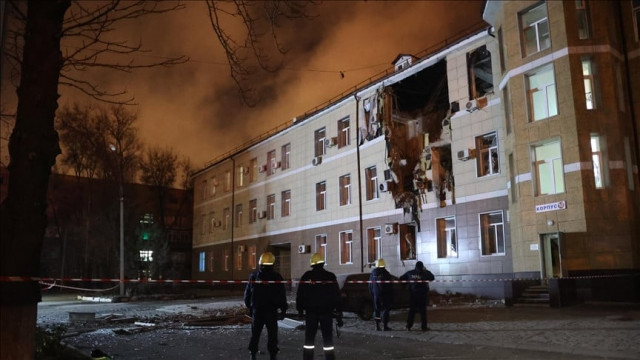WHO reports over 700 attacks on Ukraine health infrastructure
Russia's ongoing attacks increase risk of diseases, mental health, says WHO official

The World Health Organization (WHO) said it has confirmed more than 700 attacks on health infrastructure in Ukraine since Russia launched its war 10 months ago and warned the winter war increases the risk of diseases and threatens the mental health of millions.
"Since the 24th of February, WHO has verified more than 700 attacks on health care, impacting facilities, supplies, transport, and other means and injuring and killing health care workers and patients," Dr. Jarno Habicht, WHO representative in Ukraine, told UN journalists in Geneva.
"This marks a clear violation of international law. Health should never be a target,” Habicht said.
Attacks on health care put the lives of health care professionals and patients at risk and act as a significant barrier to the functioning of the health system.
"This winter will also increase the risk of diseases and health needs as people struggle to heat their homes and battle with freezing temperatures," said Habicht.
"First, respiratory, infectious, and cardiovascular diseases will increase as a result of the cold and the ongoing war," he added.
Also read: Russian deputy foreign minister says 60 Russian 'hostages' held in US
The WHO official said that ongoing attacks on energy and heating infrastructure will decrease the availability of health care services and pose a challenge for logistics and transport for the general population as they struggle to access basic health care.
"As people resort to alternative sources of heating for their homes such as burning charcoal or wood or using diesel-fuelled generators or electric heaters, the risk of carbon monoxide poisonings will increase,” he warned.
The war is also impacting people's mental health, Habicht said and noted that the WHO estimates that up to 10 million people are at risk of some form of a mental disorder, "varying from anxiety and stress to more severe conditions."
Habicht said: "Since the Russian Federation's invasion of Ukraine on 24 February, WHO has procured more than 2,000 metric tons of medical supplies for Ukraine."
WHO has reached up to 9 million people and in recent days has delivered medicines, consumables, and supplies to Bakhmut in the Donetsk region to help reach up to 10,000 people in the city – many of who fled due to heavy fighting.
In Kherson, WHO has delivered medicines, trauma kits, power generators, and other supplies to reach up to 100,000 people in the region to support health workers in providing essential care.
"In Dnipro and elsewhere, WHO delivers medicines and power generators to ensure hospitals can continue to operate and function amid the war and frequent power cuts," said the WHO official.
To continue supporting Ukraine, WHO needs ongoing budget support, including for health and humanitarian aid, Habicht added.


















COMMENTS
Comments are moderated and generally will be posted if they are on-topic and not abusive.
For more information, please see our Comments FAQ